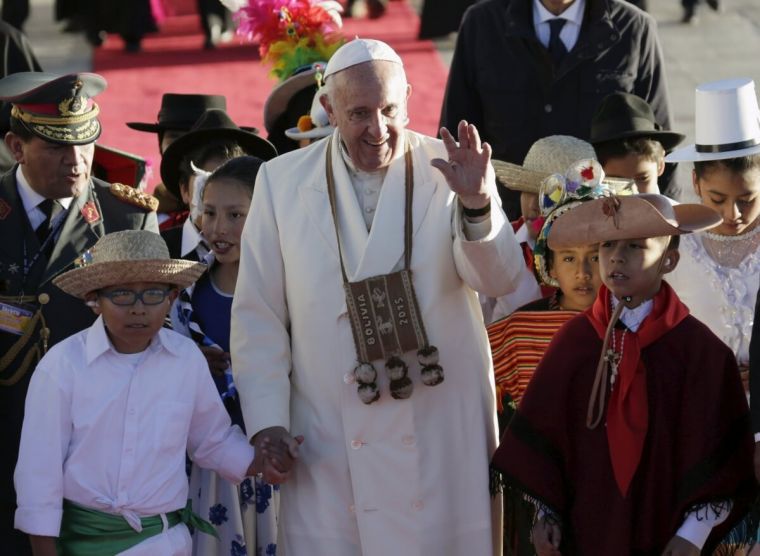Pope Francis praises Bolivia social reforms, warns against 'selfish' prosperity

Pope Francis on Wednesday praised Bolivia's social reforms to spread wealth under leftist President Evo Morales and urged the world not to view prosperity as material wealth, which he warned only breeds corruption and conflict.
Morales' strained relations with the Catholic Church have begun thawing under the Argentine-born pontiff's papacy and he warmly embraced the pope seven years after denouncing the Church as "an instrument of domination".
Francis, Latin America's first pope, made back-to-back addresses in the thin air of La Paz, which sits in a bowl surrounded by mountain peaks, and showed no sign of suffering from altitude sickness.
Aboard his flight from Ecuador, where he began his "homecoming" tour, the pope drank a tea made of a mix of coca leaves, chamomile and anise seeds to ward off illness, a flight attendant said. Local residents chew coca leaves, the main ingredient for cocaine when processed but which have only a mild stimulant effect in their natural form.
Wearing a white poncho over his white cassock to warm him against the Andean wind, Francis welcomed Bolivia's social reforms. Morales has nationalised key industries such as oil and gas to finance welfare programs and distribute wealth.
"Prosperity understood only in terms of material wealth has a tendency to become selfish ... to be unconcerned about others and to give free rein to consumerism."
"Understood this way, prosperity, instead of helping, breeds conflict," he said.
In his address to the pope, Morales, who had frequently clashed with Church officials in Bolivia before relations improved when Francis was elected in 2013, welcomed the pope as a homecoming hero.
"In many historic moments, the Church was used for domination, subjugation and oppression. Now the Bolivian people receive you with joy and hope," said Morales, wearing a dark suit with an indigenous pattern embroidered around the lapels.
"We welcome you as the chief representative of the Catholic Church coming to support the liberation of our Bolivian peoples."
The pope looked bemused when Morales handed him one of the more unusual gifts he has received: a wooden hammer and sickle – the symbol of communism – with a figure of a crucified Christ resting on the hammer.
After spending a few hours in La Paz, the Pope, who lost part of a lung to an infection when he was a young man, moved on to the low-lying provincial city of Santa Cruz for a two-day stay.
Pachamama
Francis called on people to value one another and look after the marginalised people in society.
"If politics is dominated by financial speculation, or if the economy is ruled solely by a technocratic and utilitarian paradigm concerned with maximum production, we will not grasp, much less resolve, the great problems of humanity."
Morales, an Aymara native and former coca grower, came to power in 2006 promising to govern in favor of the poor indigenous majority, marginalised by the ruling elite.
Local Church leaders are calling the visit "Reconciliation and Renewal" and say the pope will seek to heal rifts between the country's indigenous people and descendants of its Spanish colonial conquerors, who brought the Catholic faith to Bolivia.
"Christianity has played an important role in shaping the identity of the Bolivian people," the pope said.
Government ministers cite the pope's concerns for the environment as a bridge to a deeper rapprochement. The indigenous people of the Andes revere the goddess Pachamama, or Earth Mother.
The pope, who has made defence of the poor and the planet major planks of his papacy, also praised the fact that the Bolivian constitution "recognises the rights of individuals, minorities and the natural environment".
Addressing the need for diplomacy to avoid conflict between neighbouring countries, Francis departed from his script and made a reference to landlocked Bolivia's battle to reclaim access to the Pacific Ocean.
Bolivia lost access to the coastline in a 19th century war with Chile and took its case to the International Court of Justice.
"On the sea, dialogue is indispensable," Francis said to wide applause.
Francis flew into Bolivia from Quito, Ecuador, where he showed his sense of humour during the last few hours of his trip to that country. In Ecuador he drew crowds totaling nearly 2 million people.
"I have a prepared script, but I don't want to read it," said the 78-year-old pope to laughs from the crowd, before asking them to pray for him so that he would never forget where he came from.
"Do not fall into a spiritual Alzheimer's, do not forget!" Francis added in a totally improvised speech.











